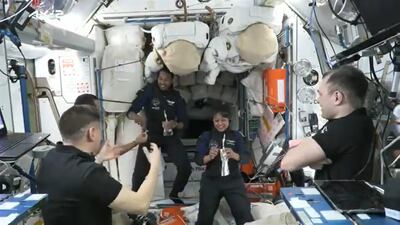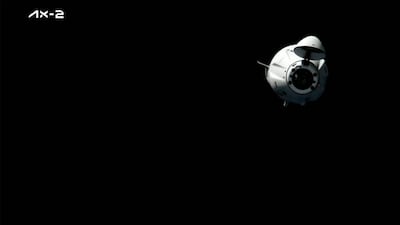Saudi astronauts Rayyanah Barnawi and Ali Al Qarni have a jam-packed schedule during their eight-day stay on the International Space Station, including science experiments around cancer research.
They are the first Saudi citizens in space since 1985, with the kingdom hoping that their mission inspires young Arabs into science, tech, maths and engineering subjects.
Ms Barnawi, 33, a research scientist, and Mr Al Qarni, 31, a fighter pilot, arrived at the orbiting outpost on Monday.
Their trip also means that researchers across Saudi Arabia had the opportunity to send crucial experiments on health sciences and weather technology with the astronauts, so they could be tested in microgravity conditions.
Mishaal Ashemimry, special adviser to the chief executive of the Saudi Space Commission, spoke to The National on Monday about the astronauts' activities.
“We have 11 scientific experiments and three outreach experiments, so a total of 14,” she said.
“Six of those experiments are focused on human health, and trying to understand the effect of microgravity and a short stay mission on the nervous system on a cellular level, tissue level and on an organ.
“Four experiments are going to be focused on inflammatory responses, which has implications to cancer.
“And then one of the experiments is kind of unique in the fact that it is the first to look at artificial rain or cloud seeding in microgravity.”
Cancer research in space
Ms Barnawi has nearly a decade of experience in cancer stem-cell research and will be using her expertise on the station.
She will be taking part in a study called Modelling Tumour Organoids that could help develop stem cell models that help predict and prevent cancer.
The research involves monitoring breast cancer cells to study immune dysfunction and drug challenges.
It is hoped the experiment will help improve the detection of and therapies for pre-cancer, cancer and a variety of other diseases.
Researchers at the Space Stem Cell Orbital Research programme, in partnership with Sanford Stem Cell Institute, the JM Foundation and Axiom Space, have sent the experiment.
Studying human immune cells
Another life sciences experiment involves investigating the inflammatory response of human immune cells in microgravity.
Ms Barnawi will study the changes in mRNA decay, a process that regulates gene expression changes in cells and can influence the effects of inflammation.
Researchers from the Saudi Arabia's King Faisal Specialist Hospital and Research Centre have sent a type of white blood cells to the ISS that will be treated with a substance that stimulates an inflammatory response.
It will be carried out in parallel with experiments on the ground, to help scientists measure the difference in results.
Findings could help researchers better understand the immune system and develop potential therapies for inflammatory diseases in space and on Earth.
Cloud seeding experiments
Mr Al Qarni will be carrying out a physical science experiment that involves cloud seeding, or artificial rain.
This is the first time cloud seeding will be studied in microgravity conditions.
“The goal of this experiment is to essentially look at the potential to create water droplets by using the same methods for cloud seeding, which is introducing silver iodide into moisture, and to see if it can create nucleation and produce water droplets,” Ms Ashemimry said.
This could help create artificial rain in lower-gravity areas like the Moon and Mars, she said.
Mr Al Qarni will mix moist air and salt crystals in a reaction chamber to see if water droplets form.
The experiment has been sent by the King Fahd University of Petroleum and Minerals, the Saudi Space Commission and Nanoracks, a US company that helps its customers launch experiments and technology to space.











